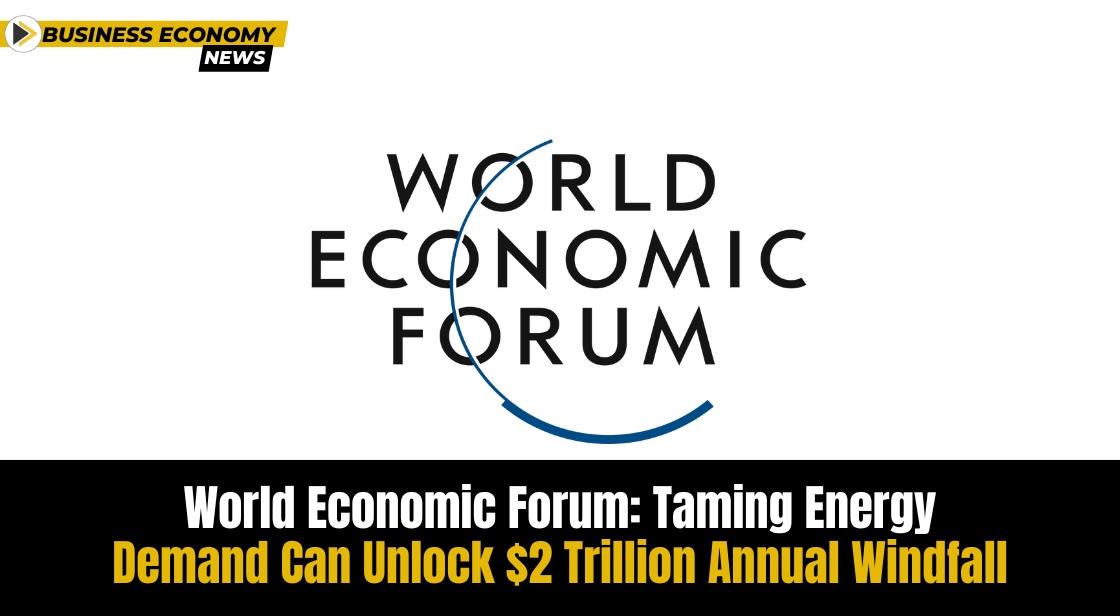World Economic Forum: Taming Energy Demand Can Unlock $2 Trillion Annual Windfall

News Synopsis
A recent World Economic Forum WEF study highlights the substantial economic benefits of focused business initiatives directed at reducing energy demand. The report underscores potential annual savings of $2 trillion for the global economy by the decade's end, alongside pivotal greenhouse gas emissions reduction.
Boosting Growth and Environmental Impact
Releasing this insightful report before the Annual Meeting in Davos, the WEF underscores that strategic policy frameworks and business actions can unlock growth, enhance productivity, reduce emissions, and position companies for competitive advantages.
Collaborative Efforts and Industry Support
The WEF report, created in partnership with PwC and backed by over 120 global CEOs from the International Business Council (IBC), highlights the significant support and participation from businesses representing a substantial 3% of global energy usage.
A Call to Action: Governments Set the Stage, Businesses Lead the Way
With global energy giants backing the initiative, including CEOs representing 3% of the world's energy consumption, momentum is building. Governments play a crucial role by setting ambitious targets:
-
COP28 Commitments: The recent UN climate conference saw countries pledging to triple global renewable energy capacity by 2030 and double energy efficiency improvement rates.
-
Double the Pace: To meet these goals, energy intensity reduction needs to accelerate at least twice the rate observed in previous years, demanding proactive steps from the private sector.
Action Plan: From Smart Buildings to Electrified Transport
The WEF report outlines a practical roadmap for businesses, focusing on key areas:
-
Buildings: Implement smart technologies like AI for optimized energy use, invest in energy-efficient retrofits, and promote sustainable construction practices.
-
Industry: Embrace automation and AI to optimize factory processes, foster collaboration across value chains for efficient energy sharing, and explore industrial clustering for shared clean energy solutions.
-
Transport: Electrify vehicles, invest in public transportation infrastructure, and encourage greener logistics practices.
By embracing these measures, businesses can unlock a lucrative economic opportunity while taking a critical step towards a more sustainable future. The choice is clear: taming energy demand isn't just a cost-saving strategy; it's a growth engine and a climate imperative.
Private Sector's Role in Energy Demand Reduction
The WEF's study underscores practical steps for businesses to curtail energy demand, emphasizing reductions in energy intensity across buildings, industries, and transportation sectors. Initiatives include leveraging AI for optimized industrial processes, collaborative clean energy endeavors, and infrastructure enhancements.
Driving Practical Measures: Redefining Business Practices
The report highlights tangible business actions such as leveraging artificial intelligence in industrial line design optimization, fostering value chain collaborations, promoting clean energy initiatives in industrial clusters, retrofitting buildings, and embracing electrification in transport.
The WEF's report signals a transformative potential for the global economy through strategic business interventions focused on energy demand reduction. Efforts in this direction not only promise substantial economic savings but also contribute significantly to environmental sustainability and competitive edge for companies worldwide.
The World Economic Forum: A Global Hub for Shaping the Future
The World Economic Forum (WEF) is an international non-governmental organization (NGO) known for its annual gathering in Davos, Switzerland, where world leaders, business executives, academics, and other influencers convene to discuss global issues and shape the future. Founded in 1971 by German engineer Klaus Schwab, the WEF has evolved into a powerful platform for:
1. Fostering Dialogue: WEF facilitates discussions and collaborations between diverse stakeholders on pressing global issues like climate change, economic inequality, technological advancements, and geopolitical challenges. By bringing together leaders from different sectors and backgrounds, the forum aims to find innovative solutions and build consensus on critical matters.
2. Promoting Sustainable Development: The WEF champions the concept of "stakeholder capitalism," emphasizing that businesses should not only prioritize profits but also consider the broader social and environmental impact of their operations. The forum encourages companies to adopt sustainable practices and contribute to the UN's Sustainable Development Goals.
3. Driving Innovation: WEF serves as a platform for showcasing cutting-edge technologies and exploring their potential to address global challenges. The forum facilitates discussions on disruptive technologies like artificial intelligence, blockchain, and renewable energy, aiming to accelerate their development and responsible application.
4. Shaping Public Policy: WEF research and reports inform policy decisions at national and international levels. The forum's analysis of global trends and expert insights provide valuable guidance to governments and organizations as they navigate complex challenges.
5. Building Communities: WEF fosters collaboration between different communities, such as business leaders and academics, youth and experienced professionals, and representatives from different regions and cultures. This exchange of ideas and perspectives contributes to a more inclusive and interconnected world.
In short, the World Economic Forum is a catalyst for positive change. It brings together global leaders to address critical issues, promote sustainable practices, and shape a better future for all.
Here are some additional facts about the WEF:
WEF Mission
Improving the state of the world by engaging business, political, academic, and other leaders of society to shape global, regional and industry agendas.
WEF Membership
Over 1,000 member companies, mostly multinational corporations.
WEF Activities
Annual meeting in Davos, regional events, research and reports, initiatives and partnerships.
You May Like









